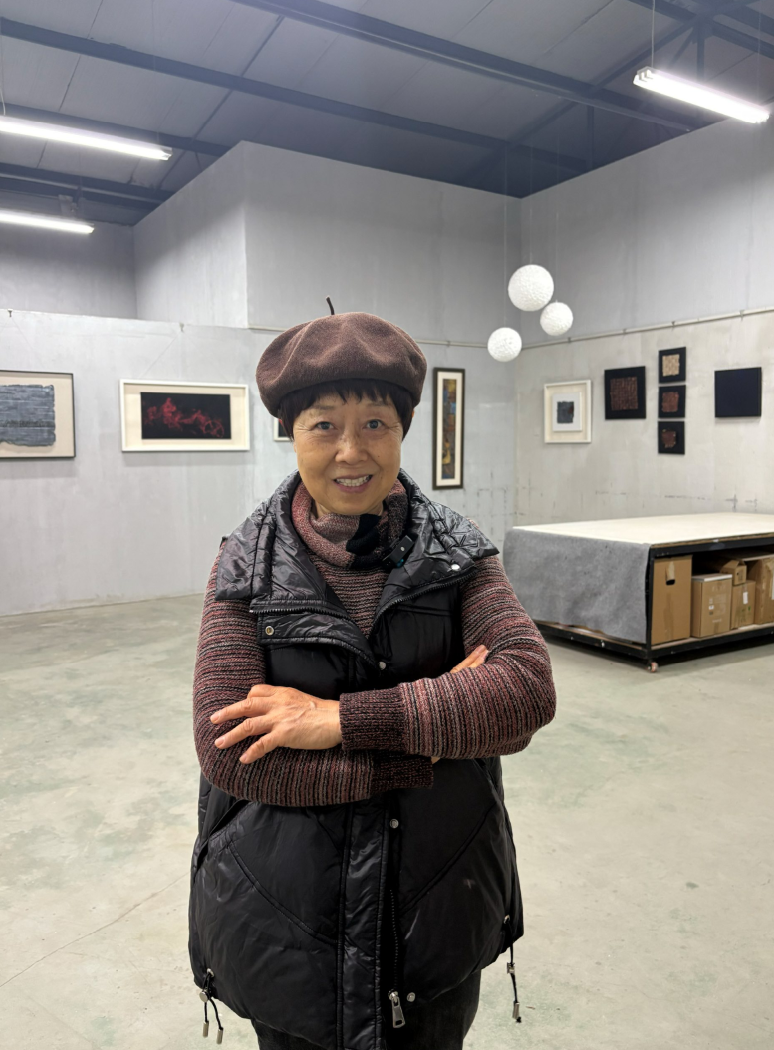Art School Alumni Growth Interview Series
When I got a DM on Xiaohongshu applying for the interview, I thought it was from a young creator.
She introduced herself: “I type slowly. I’m 68 years old.”
I froze. On the other side of the screen was someone who had crossed time itself to return to art.
Her name is Deng Yimei. She entered the Sichuan Fine Arts Institute in 1985, graduated in 1987.
Now, at nearly seventy, she’s still growing stubbornly—using old newspapers, fallen leaves, pinecones, and light to keep creating.
⸻
- Back Then: The Rare Chance to Learn
“Getting into Sichuan Fine Arts in ’85 was no small thing. The learning atmosphere was amazing,” she recalled.
Even the professors were moved by their students’ dedication: “Seeing your energy reminds us of ourselves back then.”
Her classmates came from different workplaces, sent to study art full-time. Most were already married, with kids, so they cherished the opportunity as if every class were gold. “People were scared to miss even one lesson,” she said.
Some had it rough financially—one classmate fainted in the dorm after surviving on just one steamed bun a day.
For her graduation project, she chose printmaking, inspired by Käthe Kollwitz:
“Prints have a raw, powerful energy of their own.”
Under the influence of Zhuang Hongyi and Mi Jinming, she moved toward imagination and contemporary expression.
⸻
- From the Cultural Center to the Museum: Reality vs. Hidden Desire
After graduation, she returned to her job in the cultural system—making propaganda posters, guiding amateur artists, organizing rural art workshops.
Life was stable, but it quietly smothered her creative spark.
“Inspiration came less and less. I was buried in administrative work.”
She took things too seriously—so much that even in her sleep, her mind wouldn’t stop. Eventually, her health broke down.
Severe vertigo made normal work impossible.
She once served as the head of an art association, but the endless bureaucracy pushed her further away from creation.
There was a time when she could’ve gone to Beijing, to a more open art scene.
But she didn’t. “Family concerns,” she said simply. “My biggest regret is letting down my teachers’ trust.”
⸻
- Retirement: Reigniting the Fire
Her true creative explosion came after retirement in 2014.
She rented a small, rough studio in the countryside.
She’s always been fascinated by little, overlooked things—so once she finds something interesting, she never lets it go.
Old newspapers, wrapping paper, bottles, leaves, pinecones—all her materials.
Once she even picked up a piece of Russian newspaper on the street.
She transforms the most ordinary waste into shiny, metallic-looking abstract art:
“Paper is soft, but I make it hard, powerful.”
“There’s no trash in my eyes—just treasures in the wrong place.”
⸻
- Compassion Makes Her Contemporary
During the interview, she often brought up compassion and life.
“I feel moved looking at a blade of grass, or a stone.”
Her old dog can barely walk, yet she still takes care of it tenderly.
She’s the kind of person who cries watching cartoons.
Her work radiates that quiet empathy—it’s never loud, but it cuts straight to something universal:
How do we use what’s been discarded?
That question carries both environmental meaning and her own life metaphor.
⸻
- Her Time Feels Even Tighter Than Ours
“I never feel like I’m 70. I feel young—really young.”
She practices yoga, doing poses most people half her age wouldn’t dare try.
She’s learning AI tools, running her Xiaohongshu account, trying to reach people who understand her art.
Retirement didn’t slow her down—it turned her into a late-blooming genius catching up on a long-overdue homework.
“My biggest joy is discovering and creating beauty in everyday life.”
Her next dream?
To hold a large solo exhibition in Chengdu, one that truly fits her art.
“Maybe it’s a wild dream,” she laughed, “but I want to see it happen.”
⸻
Epilogue
Every life has a doorway where you can start over.
When I finished writing, I remembered what she said at the very start of our talk:
“I just feel there’s never enough time. How could I ever be bored?”
She’s not one of those effortlessly gifted artists.
She’s someone delayed by life, yet still fiercely believing in art.
We always say young people need role models.
But Deng Yimei shows us something deeper:
The brightest moment of life doesn’t have to happen when you’re young.
Whenever you burn—that’s your youth.
And if you, too, have wavered between reality and dreams, regretted, given up, or started over—
then join us in Rising and Falling Lines.
Art will never think you’re too late.
